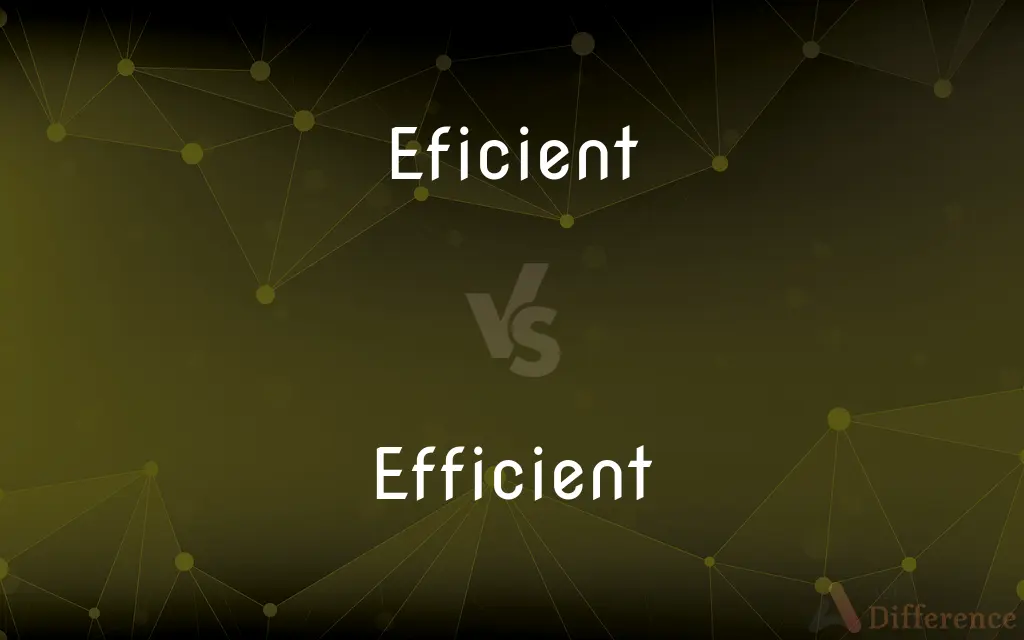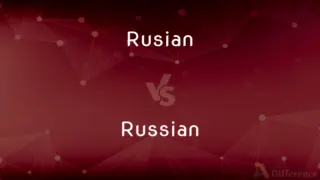Eficient vs. Efficient — Which is Correct Spelling?
By Tayyaba Rehman — Updated on April 1, 2024
"Eficient" is a common misspelling. The correct spelling is "Efficient," which means performing or functioning in the best possible manner with minimal waste.

Table of Contents
Which is correct: Eficient or Efficient
How to spell Efficient?

Eficient
Incorrect Spelling

Efficient
Correct Spelling
ADVERTISEMENT
Key Differences
Remember "effort" requires two 'f's, just like "Efficient."
Recall the prefix "eff-" as in "effect" to get "Efficient."
Think of the term "effectively" and remember the double 'f' to spell "Efficient."
The word "efficiently" also has double 'f's, reinforcing the spelling.
"Efficient" has two 'f' letters while "Eficient" only has one.
ADVERTISEMENT
How Do You Spell Efficient Correctly?
Incorrect: Their team is known for being highly eficient in project management.
Correct: Their team is known for being highly efficient in project management.
Incorrect: The new machine is very eficient in saving energy.
Correct: The new machine is very efficient in saving energy.
Incorrect: An eficient process saves both time and money.
Correct: An efficient process saves both time and money.
Incorrect: We need to be more eficient in how we handle customer service.
Correct: We need to be more efficient in how we handle customer service.
Incorrect: She found an eficient way to organize her work.
Correct: She found an efficient way to organize her work.
Efficient Definitions
Direct and immediate in action; effective.
An efficient solution to the problem.
Preventing the wasteful use of a particular resource.
An efficient use of water.
"Efficient" means achieving maximum productivity with minimal wasted effort.
She is an efficient worker.
(of a system or machine) achieving maximum productivity with minimum wasted effort or expense
More efficient processing of information
(of a person) working in a well-organized and competent way
An efficient administrator
Acting or producing effectively with a minimum of waste, expense, or unnecessary effort
An efficient builder.
An efficient factory.
Acting directly to produce an effect
The efficient cause of the revolution.
Causing less waste or requiring less effort than comparable devices or methods. Used in combination
Energy-efficient wind turbines.
Cost-efficient health care.
Making good, thorough, or careful use of resources; not consuming extra. Especially, making good use of time or energy
An efficient process would automate all the routine work.
Our cleaners are almost too efficient: they throw away anything left out on a desk.
Expressing the proportion of consumed energy that was successfully used in a process; the ratio of useful output to total input
The motor is only 20% efficient at that temperature.
Causing effects, producing results; bringing into being; initiating change (rare except in philosophical and legal expression efficient cause = causative factor or agent)
Ownership, maintenance, or use of the automobile need not be the direct and efficient cause of the injury sustained
Effective, efficacious
(obsolete) a cause; something that causes an effect
Causing effects; producing results; that makes the effect to be what it is; actively operative; not inactive, slack, or incapable; characterized by energetic and useful activity; as, an efficient officer, power.
The efficient cause is the working cause.
An efficient cause; a prime mover.
God . . . moveth mere natural agents as an efficient only.
Being effective without wasting time or effort or expense;
An efficient production manager
Efficient engines save gas
Able to accomplish a purpose; functioning effectively;
People who will do nothing unless they get something out of it for themselves are often highly effective persons...
Effective personnel
An efficient secretary
The efficient cause of the revolution
Being able to accomplish something with the least waste of time and effort.
The system is efficient and user-friendly.
Working in a well-organized and competent manner.
He runs an efficient office.
Efficient Meaning in a Sentence
Finding efficient routes can save time in daily commutes.
Efficient communication is key to avoiding misunderstandings.
An efficient worker completes tasks faster and with fewer mistakes.
Technology has made information retrieval more efficient than ever.
Efficient teamwork leads to better outcomes and satisfaction.
Efficient study techniques can improve learning outcomes.
Using efficient methods can greatly increase productivity.
Energy-efficient appliances can help reduce electricity bills.
Efficient planning is crucial for successful event management.
Time management is essential for efficient work and personal life balance.
Businesses strive for efficient operations to maximize profits.
Efficient coding practices save developers time and effort.
Water-efficient gardening practices help conserve water.
Efficient use of resources is important for sustainable living.
Efficient heating systems are important for energy conservation in homes.
Creating efficient workflows can streamline operations in any organization.
Investing in efficient lighting can lower energy consumption significantly.
Efficient decision-making processes help in quick and effective problem-solving.
Efficient use of space is crucial in small homes and apartments.
Efficient logistics management is critical for supply chain success.
Developing efficient habits can lead to a more organized and productive life.
Efficient software algorithms can process data more quickly and accurately.
Efficient markets theory discusses the reflection of information in stock prices.
Efficient public transportation systems can reduce traffic congestion.
Efficient packaging reduces waste and environmental impact.
Common Curiosities
What is the singular form of Efficient?
Efficient.
What is the root word of Efficient?
The root is derived from the Latin "efficere" meaning "to accomplish."
Which vowel is used before Efficient?
"An" as in "an efficient method."
Which conjunction is used with Efficient?
Any conjunction can be used, depending on the context.
Why is it called Efficient?
Derived from Latin "efficient-", meaning accomplishing or producing, especially with little waste.
What is the verb form of Efficient?
"Efficient" doesn't have a verb form, but "to effectuate" might be conceptually close.
What is the pronunciation of Efficient?
/ɪˈfɪʃ.ənt/
What is the plural form of Efficient?
Efficient doesn't have a plural form as it is an adjective.
Which preposition is used with Efficient?
"At" as in "efficient at doing something."
Which article is used with Efficient?
Both "an" and "the" can be used, depending on context.
Is Efficient a countable noun?
No, it's an adjective.
Is the word Efficient imperative?
No.
What is another term for Efficient?
Effective.
Which determiner is used with Efficient?
"This" as in "this efficient method."
Is Efficient an adverb?
No, but "efficiently" is the adverbial form.
Is Efficient an abstract noun?
No.
What is the first form of Efficient?
There isn't a verb form for "Efficient," so this doesn't apply.
What is the second form of Efficient?
Same as above.
Is Efficient a noun or adjective?
Adjective.
Is Efficient a negative or positive word?
Generally positive.
What is the opposite of Efficient?
Inefficient.
How is Efficient used in a sentence?
The new software is much more efficient than the previous version.
What is a stressed syllable in Efficient?
The second syllable, "fi."
What is the third form of Efficient?
Same as above.
Is Efficient a vowel or consonant?
"Efficient" is a word consisting of both vowels and consonants.
Is Efficient a collective noun?
No.
Is the Efficient term a metaphor?
No.
How many syllables are in Efficient?
Three syllables.
How do we divide Efficient into syllables?
Ef-fi-cient.
What part of speech is Efficient?
Adjective.
Share Your Discovery

Previous Comparison
Opent vs. Opened
Next Comparison
Rusian vs. RussianAuthor Spotlight
Written by
Tayyaba RehmanTayyaba Rehman is a distinguished writer, currently serving as a primary contributor to askdifference.com. As a researcher in semantics and etymology, Tayyaba's passion for the complexity of languages and their distinctions has found a perfect home on the platform. Tayyaba delves into the intricacies of language, distinguishing between commonly confused words and phrases, thereby providing clarity for readers worldwide.














































